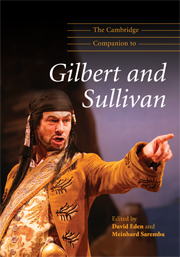Book contents
- Frontmatter
- Part I Background
- Part II Focus
- 5 The operas in context: stylistic elements – the Savoy and beyond
- 6 The librettos in context: Gilbert's ‘fables in song’
- 7 ‘This particularly rapid, unintelligible patter’: patter songs and the word–music relationship
- 8 Standing still and moving forward: The Mikado, Haddon Hall and concepts of time in the Savoy operas
- 9 Musical contexts I: motives and methods in Sullivan's allusions
- 10 Musical contexts II: characterisation and emotion in the Savoy operas
- Part III Reception
- Part IV Into the twenty-first century
- Appendix 1 Who wrote the overtures?
- Appendix 2 Stage and choral works by Arthur Sullivan and W. S. Gilbert
- Appendix 3 Modern editions of works by Arthur Sullivan and W. S. Gilbert
- Appendix 4 Sullivan's archetypes of English opera
- Notes
- Bibliography and further reading
- Index
- Plate section
8 - Standing still and moving forward: The Mikado, Haddon Hall and concepts of time in the Savoy operas
from Part II - Focus
Published online by Cambridge University Press: 28 September 2011
- Frontmatter
- Part I Background
- Part II Focus
- 5 The operas in context: stylistic elements – the Savoy and beyond
- 6 The librettos in context: Gilbert's ‘fables in song’
- 7 ‘This particularly rapid, unintelligible patter’: patter songs and the word–music relationship
- 8 Standing still and moving forward: The Mikado, Haddon Hall and concepts of time in the Savoy operas
- 9 Musical contexts I: motives and methods in Sullivan's allusions
- 10 Musical contexts II: characterisation and emotion in the Savoy operas
- Part III Reception
- Part IV Into the twenty-first century
- Appendix 1 Who wrote the overtures?
- Appendix 2 Stage and choral works by Arthur Sullivan and W. S. Gilbert
- Appendix 3 Modern editions of works by Arthur Sullivan and W. S. Gilbert
- Appendix 4 Sullivan's archetypes of English opera
- Notes
- Bibliography and further reading
- Index
- Plate section
Summary
In 1892 Arthur Sullivan without Gilbert, and with Sydney Grundy, offered the English public an ‘Original Light English Opera’, entitled Haddon Hall. Although its eventual run of 214 performances at the Savoy Theatre was far less spectacular than that of HMS Pinafore, Patience or The Mikado, the work must be counted a popular and critical success which was attested by more than twenty reviews of the production. Notwithstanding such critical acclaim, however, Haddon Hall has failed to recapture the stage in spite of several revivals. Most simply blame Grundy's libretto. Jane Stedman has criticised Grundy's style in comparison with Gilbert's and has claimed that, although some of Sullivan's librettists were ‘markedly successful in writing non-musical plays, none gave Sullivan what Gilbert's librettos gave him’. From the very beginning The Daily Telegraph, which had praised Sullivan's music highly, took Grundy to task: ‘The great weakness of the libretto … is the dramatic insignificance of the main characters’ (26 September 1892), while the Pall Mall Budget on 29 September insisted that the work had ‘a want of balance in the idea – a structural deficiency which it is very hard to forgive’. Bernard Shaw made his Haddon Hall review a vehicle to derogate the absent Gilbert, ‘whose great fault was that he began and ended with himself’; however, though he attributed the work's success to ‘the critical insight of Mr Grundy’, even he found segments of the libretto quite clumsy.
- Type
- Chapter
- Information
- The Cambridge Companion to Gilbert and Sullivan , pp. 109 - 121Publisher: Cambridge University PressPrint publication year: 2009



